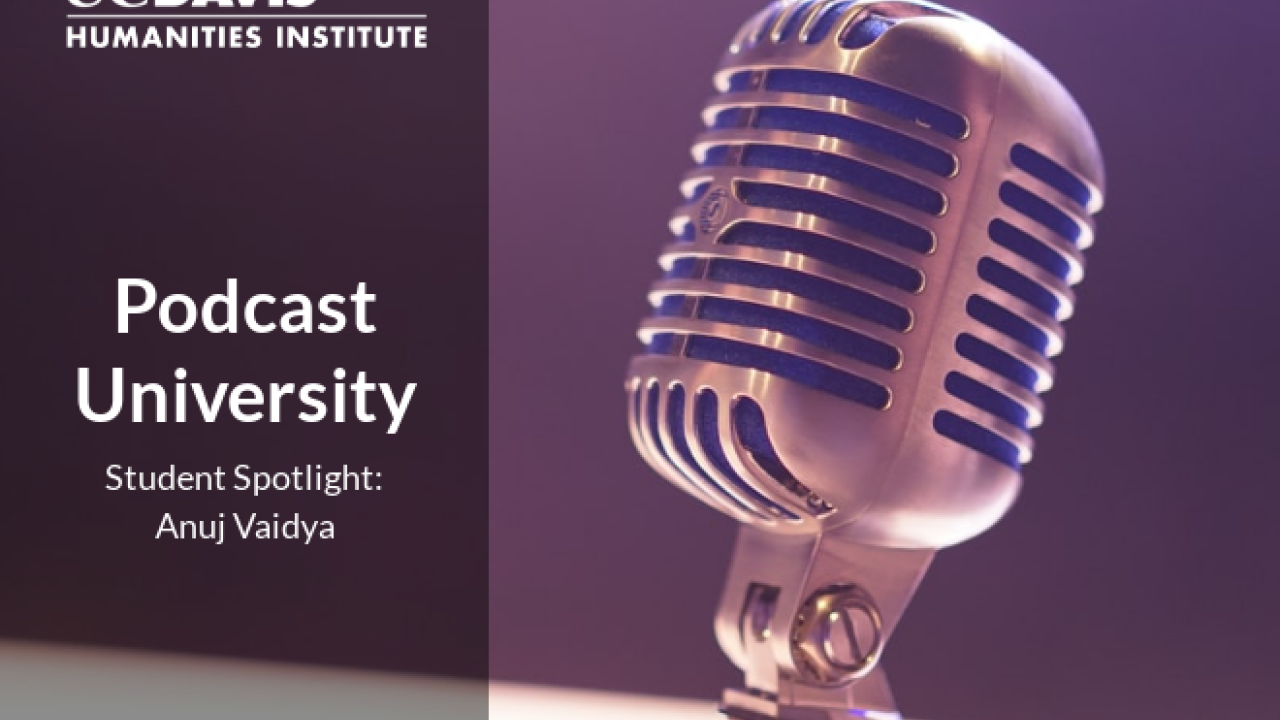
Podcast University Profile: “Of Forests and Floods” with Anuj Vaidya
Welcome to “Podcast University: Sounding Stories from Across the Humanities,” a series highlighting podcasting projects by UC Davis graduate students, faculty, and staff. You can learn more about podcasting at the DHI on our podcast page.
Anuj Vaidya is an artist, educator, media curator, and PhD candidate in Performance Studies at UC Davis whose work addresses issues of gender, sexuality, and ecology. He is also the creator of Of Forests and Floods, a podcast that explores the Aarey forest in Mumbai, India.
Of Forests and Floods came out of fieldwork in India that Anuj began in June 2019. While in Mumbai, Anuj learned about the Aarey Forest, a forest of over 2000 acres located within the city. This forest is not only a biodiversity hotspot, but also home to approximately 10,000 Indigenous Warli tribal members, whose relationship with the forest allows them to preserve their traditional lifeways. However, as land for building becomes more expensive, the livelihoods of these Indigenous people and the existence of the forest itself is under threat from development. A coalition of Indigenous leaders, environmentalists, and local citizens came together to protect the forest, and the #SaveAarey movement was born. By 2019, the movement had begun to heat up as courts dismissed cases by environmentalists and local activists began blockading buildings and work sites to prevent logging. Eventually, in a significant win for activists, the local government officials lost the midterm elections in a campaign largely based on the #SaveAarey issue. However, electoral gains are temporary, and the fate of the forest remains uncertain. After meeting with Indigenous leaders and activists, Anuj wanted to share their stories and highlight the fight to save this unique forest.
Of Forests and Floods has three episodes, each examining the webs of relations that make up the Aarey forest from different vantage points. The first episode, “Of Forests and Floods,” is an “experiment in speculative multispecies ethnography” portraying the city of Mumbai in 2046. Looking back from this not-so-far future in which the city has been submerged by climate change-induced flooding, the episode looks back to 2019 as a moment of possibility for creating a different future. The second episode, “The Latent Forest” shifts registers from speculative future history to documentary. This episode documents the #SaveAarey movement and features interviews with activists and leaders in the Warli community. Finally, the third episode, “Rewilding Aarey,” focuses on Mumbai-based environmental activist Sanjiv Valsan and his work to rewild Mumbai’s urban forests.
Of Forests and Floods is a story of change and preservation, urban development and Indigenous tradition. It is a story of resistance, coalition building, and activism. It is also a story of success: 600 acres of the Aarey forest have already been protected, and activists hope that it will soon be joined by 600 more.
As a media artist and curator, Anuj came to this podcast with a strong grasp of sound editing. That said, his advice to new podcasters is to jump in and get started. He recommends setting simple goals with each project, treating every episode as an opportunity to learn a new tool or develop a single idea. Rather than aiming for perfection, try to pick up skills as you go and be open to learning on the job or in the field. He also suggests starting with small, manageable projects; for example, you could make a three minute preview of a longer piece, record only the introduction to an episode, or pitch a short guest spot to a local radio station.
Anuj also offered practical advice. He suggests archiving all your sound files and labeling them with a consistent file-naming system. Although this can be tedious, keeping your files organized facilitates the process of creation and will make your podcasting experience much easier. Additionally, Anuj encourages new podcasters not to stress about expensive recording equipment or software. Instead, start simply by using the tools available to you—you can always add or replace equipment later if you need to.
Finally, Anuj highlighted the importance of fostering community through the podcast process. No matter the scope of your podcast, you don’t have to work alone. A workshop or class is a great way to get started, as is seeking out mentorship from someone with experience in podcasting, radio, or other forms of sound production. But collaboration can go beyond mentorship to inform every step of the creative process. This is especially important with documentary and interview style podcasts; any time you record someone, you have the unique opportunity to share their voice and “get the stories that need to be heard into the world.” In Of Forests and Floods, Anuj was careful to center Indigenous voices by building a relationship of trust and reciprocity with his interviewees and allowing that relationship to shape the project.
Anuj will return to India in the fall of 2022, and plans to continue collaborating with Indigenous communities and local activists to expand Of Forests and Floods.
Have you ever thought about starting a podcast, or are you curious about their potential for public scholarship? You can find more student profiles as well as links to events, featured podcasts, and other resources on our podcast page. And don’t forget to stay tuned for the next installment of the Podcast University: Sounding Stories from Across the Humanities!
